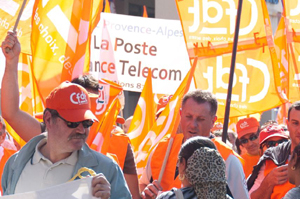Close to 3.5 million workers took to the streets of France Tuesday, protesting the government’s plans to cut public pensions. About 244 demonstrations took place throughout the country. Unions counted 330,000 in Paris, 230,000 in Marseille, and 145,000 in Toulouse.
The government disputes these figures, but both sides agree this mobilization was the biggest of any recent pension protest. Each demonstration in past weeks has seen between 2.5 and 3 million workers marching against the proposed pension overhaul, which would raise the minimum retirement age from 60 to 62 and the age for a full pension from 65 to 67.
Tuesday’s strike was also the most disruptive. Rail, port, and airport workers significantly slowed transportation. Between a third and half of short- and medium-haul flights at Paris’s two main airports were canceled, while urban transit in a number of cities was slowed. Oil refineries saw their operations substantially reduced. Students and teachers walked out of hundreds of schools.
French President Nicolas Sarkozy is hardly alone in his attack on pensions. The U.S. government is targeting Social Security. In Germany, the government has raised the age for full pension. Wealthy countries around the world are pushing to create individual pension accounts that undermine universal pension plans and put workers at risk of losing pension savings when the market dives.
Sarkozy and French employers insist that the only way to save public pensions is to require workers to spend more years in the labor force. But workers aren’t swallowing their Kool-Aid. On October 12, protesters chanted over and over: “Money? There it is! In the bank accounts of the bosses!” Over the years, successive French governments have granted billions of dollars worth of pension tax exemptions to employers.
At the same time, the share of national income going to profits has risen in recent decades, but increasingly this money has gone to dividends for stock owners, not to investment to create new jobs that could help reduce the pension deficit.
Indefinite Strikes on Horizon
The October 12 protest was important not only because of its size but also because it raised the possibility of indefinite strikes in key sectors. Workers in rail, urban transit, and oil and gas refineries have voted to extend their strikes at least until October 14, leaving open the possibility of further extensions. Port workers, already deep into a 10-day rolling strike over port privatization, are beginning to link their struggle to the national effort to block pension cutbacks.
Participation in these strikes is comparatively low: only one-third of rail workers joined the strike on October 13, compared to 53 percent on October 12. But spirits are high that the strikes could strengthen workers’ position. In 1995, when millions of workers mobilized to turn back a previous round of pension reforms, it was a three-week rolling strike that ultimately forced the government’s hand. Workers hope the same will happen here.
Young People Joining In
The October 12 protest was also important because it saw a significant rise in the participation of youth. In the days leading up to the national protest, thousands of students walked out of classes, blocked schools, and occupied roads and intersections all around the country.
These protests were small, but raised the possibility of growing youth participation. The government fears students, given their important role in blocking a 2006 bill that would have made firing workers easier. About 150,000 youth joined the national protest yesterday, many more than in previous demonstrations.
The message that pensions are a youth issue has begun to resonate. Student activists argue that raising the retirement age will shrink job opportunities for new entrants to the workforce, worsening the situation for youth who already face an unemployment rate of 24 percent.
As the movement has grown, the government has sought to speed up voting in the Senate, hoping to finish the task as quickly as possible. (The lower house of parliament has already approved the pension changes.) But this has backfired, as public support for national strikes has grown with each successive mobilization, to a peak of 71 percent on October 12. Two-thirds of the population supports indefinite strikes to block the overhaul.
Workers throughout Europe are watching the French struggle closely. If workers succeed in derailing the government’s attack on pensions, they will embolden struggles elsewhere. In recent weeks, Spain was paralyzed by a general strike that involved 10 million workers, Greece was gripped by anti-austerity protests, and 100,000 workers from across the European Union converged on Brussels to protest cuts throughout the continent.
In France, the next several weeks will determine not only the outcome of this round of pension reforms but also the character of the labor movement. Will it cave to intense pressure from the government? Will rank-and-file militancy hold? Little is certain beyond the fact that all eyes are on France.
Jason Stanley is in France researching cutbacks to government benefits.







